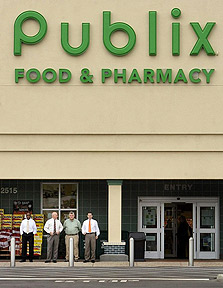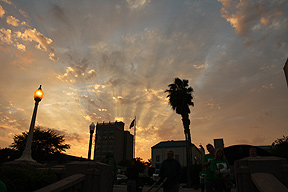Walk for Farmworker Justice
Lakeland, FL
Dec 6 , 2009
photos by JJ Tiziou
|
|
|
|
 Within the span of an hour, the protest swelled to more than 500 people — by far the largest protest to date in the nascent Publix campaign — crowded on the thin strip of sidewalk in front of the supermarket… |
… a development surely watched with growing concern by Publix’s crack team of human resources and “union avoidance” specialists. Publix investigators, and their crew of videographers, have followed the CIW from protest to protest over the past two months — even crossing state lines into Alabama and Georgia — observing firsthand the steadily growing numbers demanding that Publix be held accountable for brutal human rights violations in its tomato supply chain. It seems the investigators’ job, at least in part, is to advise Publix on how best to combat organizing campaigns. And from the looks of things so far, they seem strongly predisposed to strategies of resistance more than urging Publix toward critical thinking, engagement, and reasoned dialogue. Of course, ongoing conflict, in the world of these “labor dispute experts,” does mean greater job security. But while that’s fine for the Publix investigators and their employment prospects, it really doesn’t serve anyone else’s interests — farmworkers, consumers, participating growers, or, for that matter, Publix itself. Because while Publix may be convinced that the tactics of misdirection and resistance help protect its profits, that’s really just short-term thinking. You see, in the long-run, stubborn resistance is a double-edged sword for Publix. The longer Publix fights progress, the more protests there will be, the more abuses will surface (like this latest news), and the more Publix customers will learn of the dehumanizing conditions — the grinding poverty, back-breaking stoop labor, wage theft, abusive supervisors, discrimination and sexual harassment and, yes, slavery — in Florida’s fields. In other words, the Campaign for Fair Food will be like those Publix commercials that run incessantly during the holiday season, only the opposite, building awareness, consumer by consumer, of the reality of farm labor exploitation behind the Publix logo. And knowledge is power – the power to make change. |
|
 Which brings us right back to yesterday’s action. The Walk for Farmworker Justice spread awareness to tens of thousands more of those very consumers in and around Publix’s hometown yesterday, combining the forces of human rights activists spanning several generations — from 93-yr old Stetson Kennedy, whose lifelong career of fighting for economic and racial justice is an inspiration to all… |
After another hour on the Publix picket line, these two Fair Food activists helped lead the all-important transition from protest to march. |
|
|
|
 … followed by farmworkers from Immokalee (including two of the workers held captive and forced to pick tomatoes by a family of farm bosses in last year’s slavery prosecution)… |
|
 … and their consumer allies… |
 … by the hundreds… |
|
 … taking the message of farm labor exploitation to the streets of Lakeland on this Sunday afternoon. |
|
|
|
“The Rev. Jim Boler (retired United Church of Christ minister): There is a human rights crisis in the fields of Florida today. The sub-poverty wages, abuses, and modern-day slavery cases faced by the men and women who harvest our tomatoes are immoral and unjust. This reality calls us to speak out. The Rev. Jean Cooley (Westminster Presbyterian Church, Lakeland) : On this day we say a profound ‘no’ to the continuation of a food system that exploits our sisters and brothers in the fields. The Rev. Andy Bell (Lakewood United Methodist Church, St. Petersburg): On this day we say a resounding ‘yes’ to the emerging fair food model that ensures the dignity of farmworkers, a sustainable future of the Florida tomato industry, the social responsibility of food corporations, and fair food for consumers.” And was punctuated by a sharp reminder to Publix executives: “The Rev. Talia Raymond (First Congregational Church of Winter Park): For the leaders of Publix, that they may realize that there is no ‘fair market price’ for slavery. Instead of turning a blind eye, may they address the problem by working with the CIW to enforce a code of conduct against slavery in the fields…” |
They spoke of the stark choice facing Publix in the weeks and months ahead. They explained how, on the one hand, the supermarket chain can continue to uphold the brutal status quo in Florida’s fields today, and how that path leads inexorably to escalating conflict with farmworkers and consumers. But they also spoke of another path available to Publix today: the opportunity to support the emerging model for social responsibility in the Florida tomato industry, the opportunity to ensure that a “fair market price” for tomatoes allows workers and their families to live in dignity and without fear of their bosses, the opportunity, in the words of Publix’s own mission statement, to “be involved as responsible citizens in our communities.” And they reminded Publix executives that they would return, in ever larger numbers, until Publix joins the CIW and its customers on the path away from exploitation and toward Fair Food. |
|
|
Mr. Kennedy’s message was captured in a saying from the Spanish Civil War that he shared with the crowd: “Este dolor no se cura con resignacion“… This pain cannot be cured by resigning oneself, or giving up. He encouraged the crowd to never give up, until Publix agrees to demand respect for human rights in the fields. |
Ms. Kennedy spoke from her long-time support of the CIW and the Campaign for Fair Food and echoed the clergy in insisting that there can be no “fair market price” for slavery. |
|
|
|
“J. U. S., Needless to say, the next generation left the other generations in the house with a few tears in their eyes as they left the stage. |
|
 The rally was emceed with perfect pitch by two longtime friends of the CIW, the Rev. Charles Mckenzie, who reminded the marchers that victory will not be long in coming because “no lie can live forever”… |
 … and Cathy Eagle of Grace Methodist Church and Music with a Mission, who performed a moving version of “Amazing Grace” as the sun began to set over Mirror Lake in the heart of Lakeland. |
|
 And as the sun set, and the rally wound down, it became clear to all present that the sun was in fact setting not just on Kryger Park,… |
… but on an era. Today, in this new century with new and powerful tools of communication, no longer can the brutal conditions in our country’s fields be hidden from the public, no longer will “what happens in the fields stay in the fields.” Rather, news of the dehumanizing conditions in Immokalee and wherever fruits and vegetables are picked will reach consumers and, increasingly, consumers will hold the companies that profit from the sale of those fruits and vegetables accountable for human rights violations in the fields. The days of companies like Publix buying produce no questions asked are over, whether they realize it or not. It’s now only a question of whether Publix will be a leader — or a follower — in a movement that is already well underway. The next months will tell. |
Thanks again to photographer JJ Tiziou for his support of the CIW.
Check out some of his work at jjtiziou













